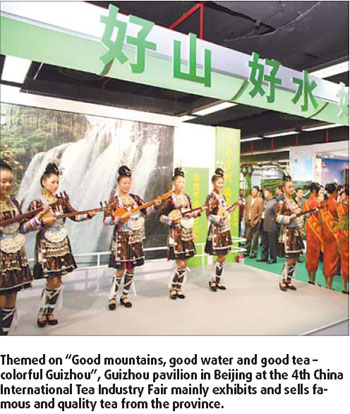International fair offers fragrant best
Guizhou represents the largest provincial delegation at the 4th China International Tea Industry Fair, which began in Beijing on Sunday. It is the sole province that has helped bring together participants from across the province for the fair.
The province organized its over-200 strong delegation from its five leading tea-producing areas and 51 enterprises. Covering an area of 11,000 sq m, the fair attracted more than 300 domestic and overseas enterprises to display their products and conduct business talks.
The theme of the Guizhou pavilion is "Good mountains, good water and good tea - colorful Guizhou". Incorporating an array of products, pictures and pamphlets, the pavilion mainly concentrates on the display and sale of famous and quality tea from Guizhou.

It introduces tea products that are mainly non-polluting, green and organic. The pavilion is divided into four areas, one each for product display, marketing, tea tasting and holding business talks, and for performance.
Wang Fuyu, deputy secretary of the Party committee of Guizhou, visited the pavilion on Sunday and made inquires about the output, sale, processing and quality of the tea.
According to Wang, Guizhou is one of the best areas for growing tea in China. It has a large plantation area that enjoys sound ecological conditions and little industrial pollution.
During the past decades, the area has utilized very little pesticides and chemical fertilizer, ensuring that the fields are rich in the trace element selenium, as well as zinc and strontium, making it an ideal natural area for "green, ecological, safe and healthy" tea products.
Guizhou has great potential for the development of the tea industry. The provincial government has already set itself the goal of building the tea industry into one of its economic pillars.
The authorities have taken measures to ensure that Guizhou becomes a key raw material base and processing center of China's high quality green tea, and an important production base for green food tea and organic tea.
The province aims to emphasize the quality, and the green and ecological edge of its tea products to establish the brand image of Guizhou's famous tea products, and to make them popular not only in the nation but around the world as well, Wang said.
Tea tradition
The province is one of China's ancient tea producing regions. In 1980, the fossil of Siqiu tea seeds found in the geological layer of the Tertiary Period in Qinglong County of the province is the sole tea seed fossil ever to be discovered in the world, and has a history going back 1 million years.
The remains of wild ancient tea shrubs and tea gardens planted in ancient times are scattered across the province till today, with three 1,000-year-old tea plants and 123 ancient tea plants planted about 500 years ago being discovered in the Guizhou Yanhe Autonomous County.
The province has more than 600 types of tea plants, making it one of the richest among China's provinces in terms of variety.
In addition, the advantages of a sound climate, fertile soil and an ecologically balanced environment have infused Guizhou's tea leaves with rich material content, lasting fragrance and freshness, as well as the capacity to produce a brightly colored drink.
In fact, many tea dealers outside the province use Guizhou tea leaf to attract clients. This has added to the high reputation and value of Guizhou tea.
According to a recent study of 83 samples from 53 enterprises in the province, the average value of trace elements, amino acids and polyphenol in Guizhou tea is 43.5, 3.5 and 29.9 percent respectively.
The amount of soaked out trace elements is higher than the national standard by 9.5 percent.
(China Daily 10/16/2007 page24)














